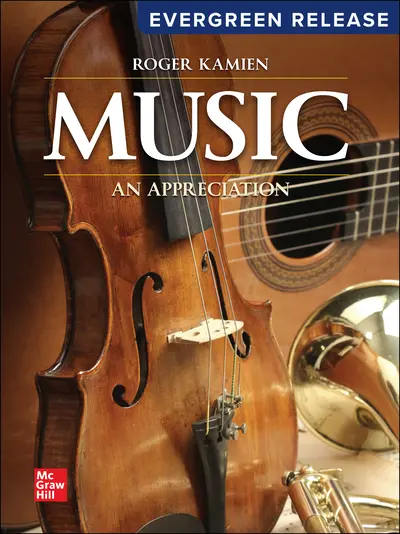My Account Details

ISBN10: 1265266255 | ISBN13: 9781265266257

* The estimated amount of time this product will be on the market is based on a number of factors, including faculty input to instructional design and the prior revision cycle and updates to academic research-which typically results in a revision cycle ranging from every two to four years for this product. Pricing subject to change at any time.
Instructor Information
Quick Actions (Only for Validated Instructor Accounts):
Music: An Appreciation welcomes nonmajors to the art of listening to great music. Roger Kamien continues to focus on coverage of the elements of music, fostering each student's unique path to listening and understanding. The latest release of Music: An Appreciation equips students with the language, tools, and listening skills to build a lifelong enthusiasm for music. Acknowledging that music isn't created in a void, the text grounds each of the periods and styles covered (Parts II - XI) in the historical and cultural events of the period, and illustrates other artistic products (fine art, literature, theatre) that were being created concurrently. New recordings have been added to the new edition. All selections can be accessed in McGraw Hill Connect®.
Listening Outlines and Vocal Music Guides Listed by Composer
Preface
PART I Elements
PART II The Middle Ages
PART III The Renaissance
PART IV The Baroque Period
PART V The Classical Period
PART VI The Romantic Period
PART VII The Twentieth Century and Beyond
PART VIII Jazz
PART IX Music for Stage and Screen
PART X Popular Music Genres
PART XI Nonwestern Music
Accessibility
Creating accessible products is a priority for McGraw Hill. We make accessibility and adhering to WCAG AA guidelines a part of our day-to-day development efforts and product roadmaps.
For more information, visit our accessibility page, or contact us at accessibility@mheducation.com
Affordability
Reduce course material costs for your students while still providing full access to everything they need to be successful. It isn't too good to be true - it's Inclusive Access.
Need support? We're here to help - Get real-world support and resources every step of the way.